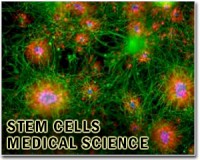 |
Houston (UPI) Dec 9, 2009 Scientists at the University of Texas Medical School at Houston say they've started a Phase II trial of a new stem cell-based therapy for injured heart muscle. During Phase I of the trial, researchers said patients were treated safely with intravenous adult human mesenchymal stem cells (Prochymal) after a heart attack. They experienced fewer arrhythmias, improved heart and lung function and improvement in overall condition. "We are able to use a stem cell product that is on the shelf without prior preparation of anything from the patient, and this product appears to be able to help the heart muscle recover after a heart attack," said Dr. Ali Denktas, the trial's Houston site principal investigator and assistant professor of cardiology. "This means patients have the potential to recover quicker with less risk of an immediate secondary attack." In many cell-based therapies, doctors harvest the patient's own cells, process them and then return them to the patient. Prochymal, developed by Osiris Therapeutics Inc., contains adult mesenchymal stem cells from healthy donors, the scientists said. The researchers Monday enrolled the first patient for the Phase II, double-blind study at the Houston site. Results from Phase I of the multi-institution trial are reported in the Journal of the American College of Cardiology. Share This Article With Planet Earth
Related Links The Clone Age - Cloning, Stem Cells, Space Medicine
 New stem cell technology developed
New stem cell technology developedJerusalem (UPI) Dec 1, 2009 Scientists at the Hebrew University of Jerusalem say they have developed a new stem cell technology that helps bone fractures heal quickly. The technology that involves isolation of the stem cells from bone marrow was developed by Drs. Zulma Gazit and Gadi Pelled, along with Professor Dan Gazit at the university's Skeletal Biotechnology Laboratory. The scientists say their technology ... read more |
|
| The content herein, unless otherwise known to be public domain, are Copyright 1995-2009 - SpaceDaily. AFP and UPI Wire Stories are copyright Agence France-Presse and United Press International. ESA Portal Reports are copyright European Space Agency. All NASA sourced material is public domain. Additional copyrights may apply in whole or part to other bona fide parties. Advertising does not imply endorsement,agreement or approval of any opinions, statements or information provided by SpaceDaily on any Web page published or hosted by SpaceDaily. Privacy Statement |